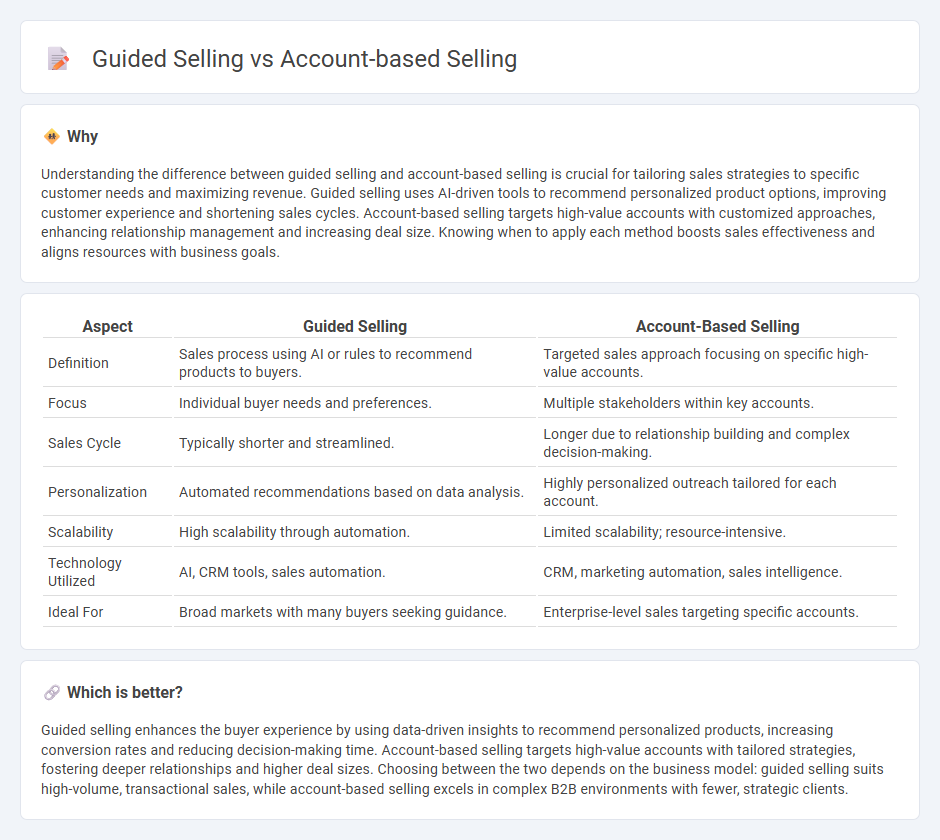
Guided selling leverages data-driven insights and AI to recommend tailored product options that align with customer needs, enhancing the buying experience and increasing conversion rates. Account-based selling focuses on personalized outreach and strategic engagement with high-value target accounts to drive deeper relationships and higher deal values. Explore how integrating these sales strategies can transform your revenue growth.
Why it is important
Understanding the difference between guided selling and account-based selling is crucial for tailoring sales strategies to specific customer needs and maximizing revenue. Guided selling uses AI-driven tools to recommend personalized product options, improving customer experience and shortening sales cycles. Account-based selling targets high-value accounts with customized approaches, enhancing relationship management and increasing deal size. Knowing when to apply each method boosts sales effectiveness and aligns resources with business goals.
Comparison Table
| Aspect | Guided Selling | Account-Based Selling |
|---|---|---|
| Definition | Sales process using AI or rules to recommend products to buyers. | Targeted sales approach focusing on specific high-value accounts. |
| Focus | Individual buyer needs and preferences. | Multiple stakeholders within key accounts. |
| Sales Cycle | Typically shorter and streamlined. | Longer due to relationship building and complex decision-making. |
| Personalization | Automated recommendations based on data analysis. | Highly personalized outreach tailored for each account. |
| Scalability | High scalability through automation. | Limited scalability; resource-intensive. |
| Technology Utilized | AI, CRM tools, sales automation. | CRM, marketing automation, sales intelligence. |
| Ideal For | Broad markets with many buyers seeking guidance. | Enterprise-level sales targeting specific accounts. |
Which is better?
Guided selling enhances the buyer experience by using data-driven insights to recommend personalized products, increasing conversion rates and reducing decision-making time. Account-based selling targets high-value accounts with tailored strategies, fostering deeper relationships and higher deal sizes. Choosing between the two depends on the business model: guided selling suits high-volume, transactional sales, while account-based selling excels in complex B2B environments with fewer, strategic clients.
Connection
Guided selling leverages data-driven insights and personalized recommendations to enhance the sales process, closely aligning with account-based selling by targeting specific high-value accounts with tailored strategies. Both approaches focus on understanding customer needs and decision-making criteria to improve conversion rates and shorten sales cycles. Integrating guided selling tools within account-based selling frameworks optimizes resource allocation and fosters stronger customer relationships by delivering relevant solutions.
Key Terms
Targeting (Account Selection)
Account-based selling targets specific high-value accounts through personalized strategies, leveraging detailed firmographic, technographic, and behavioral data to select the most promising prospects. Guided selling uses AI-driven tools and predefined criteria to dynamically recommend ideal accounts, enhancing efficiency in account selection based on real-time insights. Explore how each approach can optimize your targeting strategy to boost sales performance and ROI.
Personalization (Customization)
Account-based selling leverages detailed customer data to create highly personalized sales approaches tailored to specific accounts, enhancing engagement and conversion rates. Guided selling uses AI-driven tools to customize product recommendations and sales interactions based on real-time buyer behavior and preferences. Explore how these strategies can transform your sales process for deeper personalization and better results.
Sales Process Automation
Account-based selling targets high-value accounts through personalized outreach, leveraging CRM tools for precise lead tracking and engagement. Guided selling integrates AI-driven recommendations within sales platforms to streamline decision-making and tailor product offerings based on customer data. Explore how these sales process automation strategies enhance revenue and customer alignment for your business.
Source and External Links
What is Account-Based Selling? - DealHub - Account-based selling (ABS) is a strategy where sales teams focus on specific high-value accounts by creating personalized sales strategies tailored to each account's unique needs, aiming to generate more revenue from fewer, targeted accounts rather than broad lead-based selling.
What is Account-Based Selling? Everything You Need to Know - TechTarget - ABS is a strategic B2B sales and marketing approach that builds highly personalized relationships with specific high-value accounts by identifying ideal customers and tailoring outreach to their unique challenges and decision-making processes.
Account-Based Selling: The Ultimate Guide for 2025 - Outreach - Account-based selling is a focused, multi-touch sales strategy treating each targeted high-value account as a unique market, with sales and marketing collaborating closely to deliver personalized content and engagement that align with each account's needs, boosting trust and conversions.
 dowidth.com
dowidth.com